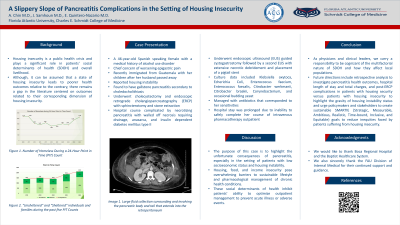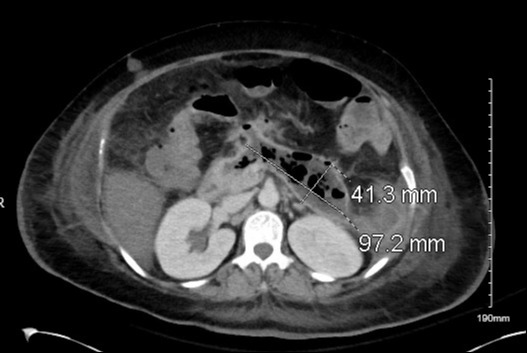Monday Poster Session
Category: Biliary/Pancreas
P1789 - A Slippery Slope of Pancreatitis Complications in the Setting of Housing Insecurity
Monday, October 28, 2024
10:30 AM - 4:00 PM ET
Location: Exhibit Hall E

Has Audio

Allison Chin, MD
Florida Atlantic University
Miami, FL
Presenting Author(s)
Allison Chin, MD1, Eduardo Quintero-Nazario, MD2, Jalal Samhoun, MD3
1Florida Atlantic University, Miami, FL; 2Baptist Health Florida/FAU Affiliate, Lantana, FL; 3Florida Atlantic University, Wellington, FL
Introduction: Housing insecurity is a public health crisis and plays a significant role in patients' social determinants of health (SDOH) and overall livelihood. Although, it can be assumed that a state of housing insecurity leads to poorer health outcomes relative to the contrary, there remains a gap in the literature centered on outcomes related to their corresponding dimension of housing insecurity.
Case Description/Methods: A 46-year-old Spanish speaking female with a medical history of alcohol use disorder presents to the Emergency Department with a concern of worsening epigastric pain. She recently immigrated from Guatemala with her children after her husband passed away and reported housing instability. She was found to have gallstone pancreatitis secondary to choledocholithiasis and underwent cholecystectomy and endoscopic retrograde cholangiopancreatography (ERCP) with sphincterotomy and stone extraction. Her hospital course was complicated by necrotizing pancreatitis with walled off necrosis requiring drainage, anasarca, and insulin dependent diabetes mellitus type II. She underwent endoscopic ultrasound (EUS) guided cystogastrostomy followed by a second EUS with extensive necrotic debridement and placement of a pigtail stent. Culture data included Klebsiella oxytoca, Echerichia Coli, Enterococcus faecium, Enterococcus faecalis, Citrobacter werkmanii, Citrobacter braakii, Corynebacterium, and occasional budding yeast. She was treated with antibiotics that corresponded to her sensitivities; however, her hospital stay was prolonged due to inability to safely complete her course of intravenous pharmacotherapy outpatient.
Discussion: The purpose of this case is to highlight the unfortunate consequences of pancreatitis, especially in the setting of patients with low socioeconomic status and housing instability. As physicians and clinical leaders, we carry a responsibility to be cognizant of the multifactorial nature of SDOH and how they affect local populations. Future directions include retrospective analysis to investigate pancreatitis health outcomes, hospital length of stay and total charges, and post-ERCP complications in patients with housing security versus patients with housing insecurity to highlight the gravity of housing instability status and urge policymakers and stakeholders to create sustainable SMARTIE (Strategic, Measurable, Ambitious, Realistic, Time-bound, Inclusive, and Equitable) goals to reduce inequities faced by patients suffering from housing insecurity.

Disclosures:
Allison Chin, MD1, Eduardo Quintero-Nazario, MD2, Jalal Samhoun, MD3. P1789 - A Slippery Slope of Pancreatitis Complications in the Setting of Housing Insecurity, ACG 2024 Annual Scientific Meeting Abstracts. Philadelphia, PA: American College of Gastroenterology.
1Florida Atlantic University, Miami, FL; 2Baptist Health Florida/FAU Affiliate, Lantana, FL; 3Florida Atlantic University, Wellington, FL
Introduction: Housing insecurity is a public health crisis and plays a significant role in patients' social determinants of health (SDOH) and overall livelihood. Although, it can be assumed that a state of housing insecurity leads to poorer health outcomes relative to the contrary, there remains a gap in the literature centered on outcomes related to their corresponding dimension of housing insecurity.
Case Description/Methods: A 46-year-old Spanish speaking female with a medical history of alcohol use disorder presents to the Emergency Department with a concern of worsening epigastric pain. She recently immigrated from Guatemala with her children after her husband passed away and reported housing instability. She was found to have gallstone pancreatitis secondary to choledocholithiasis and underwent cholecystectomy and endoscopic retrograde cholangiopancreatography (ERCP) with sphincterotomy and stone extraction. Her hospital course was complicated by necrotizing pancreatitis with walled off necrosis requiring drainage, anasarca, and insulin dependent diabetes mellitus type II. She underwent endoscopic ultrasound (EUS) guided cystogastrostomy followed by a second EUS with extensive necrotic debridement and placement of a pigtail stent. Culture data included Klebsiella oxytoca, Echerichia Coli, Enterococcus faecium, Enterococcus faecalis, Citrobacter werkmanii, Citrobacter braakii, Corynebacterium, and occasional budding yeast. She was treated with antibiotics that corresponded to her sensitivities; however, her hospital stay was prolonged due to inability to safely complete her course of intravenous pharmacotherapy outpatient.
Discussion: The purpose of this case is to highlight the unfortunate consequences of pancreatitis, especially in the setting of patients with low socioeconomic status and housing instability. As physicians and clinical leaders, we carry a responsibility to be cognizant of the multifactorial nature of SDOH and how they affect local populations. Future directions include retrospective analysis to investigate pancreatitis health outcomes, hospital length of stay and total charges, and post-ERCP complications in patients with housing security versus patients with housing insecurity to highlight the gravity of housing instability status and urge policymakers and stakeholders to create sustainable SMARTIE (Strategic, Measurable, Ambitious, Realistic, Time-bound, Inclusive, and Equitable) goals to reduce inequities faced by patients suffering from housing insecurity.

Figure: Image 1. Large fluid collection surrounding and involving the pancreatic body and tail that extends into the retroperitoneum
Disclosures:
Allison Chin indicated no relevant financial relationships.
Eduardo Quintero-Nazario indicated no relevant financial relationships.
Jalal Samhoun indicated no relevant financial relationships.
Allison Chin, MD1, Eduardo Quintero-Nazario, MD2, Jalal Samhoun, MD3. P1789 - A Slippery Slope of Pancreatitis Complications in the Setting of Housing Insecurity, ACG 2024 Annual Scientific Meeting Abstracts. Philadelphia, PA: American College of Gastroenterology.

